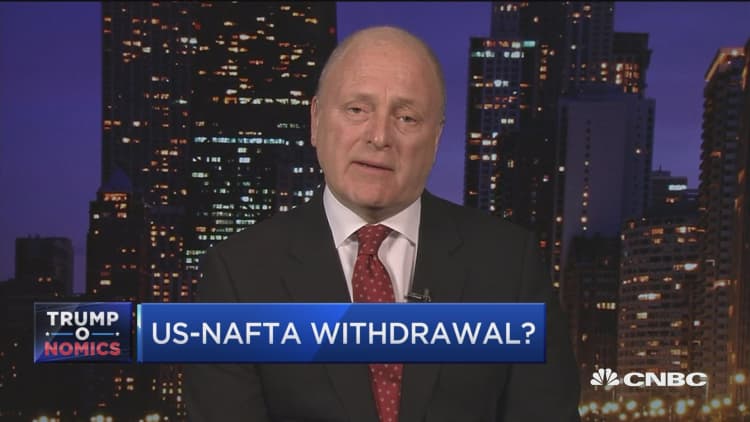
Bruce Heyman, who was U.S. ambassador to Canada under former President Barack Obama, warned the Trump administration about harming America's strong trade relationship with the world's 10th-largest economy north of the border.
Canada is increasingly convinced that President Donald Trump will pull out of NAFTA, two government sources told Reuters on Wednesday, sending the Canadian dollar and Mexican peso lower. Those currencies were more stable in Thursday trading. Mexico is the third country in the 1994 North American Free Trade Agreement.
Despite the report, nothing has changed since Trump has been threatening since the 2016 presidential campaign to exit the deal if the U.S. cannot re-negotiate better terms.
"I think we're playing a bit of Russian roulette. It's one thing to do it with your enemies. It's another thing to do it with your best friend," Heyman told CNBC's "Squawk Box" on Thursday.
Government officials are due to hold a sixth and penultimate round of negotiations in Montreal from Jan. 23 to 28 as time runs out to bridge major differences before a March deadline.
One of the arguments by the Trump administration for seeking new trade deals has been the desire to narrow trade deficits.
But according to the Office of the U.S. Trade Representative, the U.S. had a goods and services trade surplus with Canada of $12.5 billion in 2016. The trade gap with Mexico last year was a $55.6 billion deficit.
"I think it's a mistake in thinking of this in terms of deficit and surplus. It's one thing when it's an extreme when you're looking at China. But when you are looking at North America ... this is the largest trading pact that exists in the world, and I think it's broadly, incredibly successful," Heyman contended.
The deficit with Mexico is a drop in the bucket compared with the shortfall for China. The U.S. trade deficit with China was $309.6 billion in 2016.
The Trump administration is using NAFTA "as a scapegoat" because job loss in the current U.S. economy "is more a factor of automation and innovation and creativity, and not necessarily the old thought of moving plants from one country to the other based on labor," said Heyman, who like many officials in both Democratic and Republican administrations is a Goldman Sachs alum.
(Top Trump economic advisor Gary Cohn was the No. 2 executive at Goldman before joining the administration. Treasury Secretary Steve Mnuchin's resume also includes time at the firm.)
The philosophy of the Trump White House runs counter to Heyman's argument because the president has made bringing manufacturing jobs back to the U.S. a top priority.
On Wednesday, Japanese automakers Toyota and Mazda unveiled plans for a $1.6 billion assembly plant in Huntsville, Alabama.
President Donald Trump was quick with his praise on Twitter.
NAFTA was truly a bipartisan effort at the time it went into effect 24 years ago. The free trade agreement was negotiated in the Republican presidential administration of George H.W. Bush. It was later implemented by Democratic President Bill Clinton, who had supported the deal before winning the White House.
— Reuters contributed to this report.


